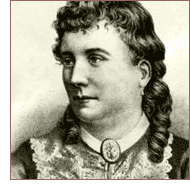Mary Elizabeth Braddon

Mary Elizabeth Braddon (October 4, 1835 – February 4, 1915) was a British Victorian era popular novelist. She is best known for her 1862 sensation novel Lady Audley's Secret.
Life
Born in London in England, Braddon was privately educated and worked as an actress for three years in order to be able to support herself and her mother Fanny, who had separated from her father Henry in 1840, when Mary was just three. When Mary was ten years old, her brother Edward Braddon left for British Raj India and later Australia, where he would become Premier of Tasmania.
In 1860, Braddon met John Maxwell, a publisher of periodicals, whom she started living with in 1861. However, Maxwell was married with five children and his wife was living in an asylum in Ireland. Mary acted as the stepmother of the children till 1874, when Maxwell's wife died, and they could get married. She had six children by him.
Braddon was an extremely prolific writer, producing some 75 novels with very inventive plots. The most famous one is her first novel, Lady Audley's Secret (1862), which won her recognition and fortune as well. The novel has been in print ever since, and has been dramatised and filmed several times.
Braddon also founded Belgravia Magazine (1866), which presented readers with serialized sensation novels, poems, travel narratives, and biographies, as well as essays on fashion, history, science. The magazine was accompanied by lavish illustrations and offered readers a source of literature at an affordable cost. She also edited Temple Bar Magazine. Braddon's legacy is tied to the Sensation Fiction of the 1860s.
She died on February 4, 1915 in Richmond, England and is interred there in Richmond Cemetery. Her home had been Lichfield House in the centre of town; it was replaced by a block of flats, the now listed Lichfield Court, in 1936. She has a plaque in Richmond Parish church and a number of streets in the area are named after characters in her novels; her husband was a property developer in the area.
Partial bibliography
Novels
|
|
Collections
- Ralph the Bailiff and Other Tales (1862)
Theatre
- Griselda (1873)
References
- Bleiler, Everett (1948). The Checklist of Fantastic Literature. Chicago: Shasta Publishers. p. 58.
